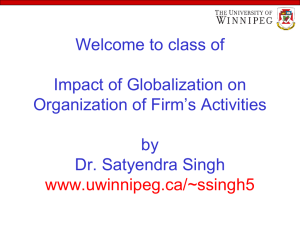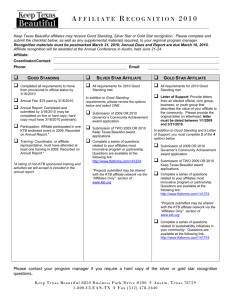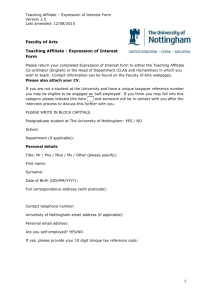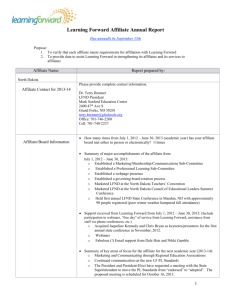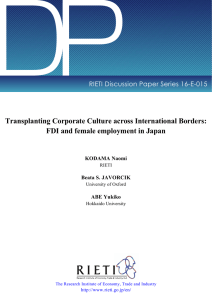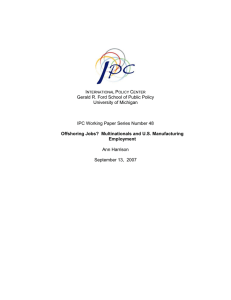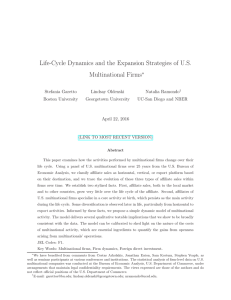Affiliate Management
advertisement
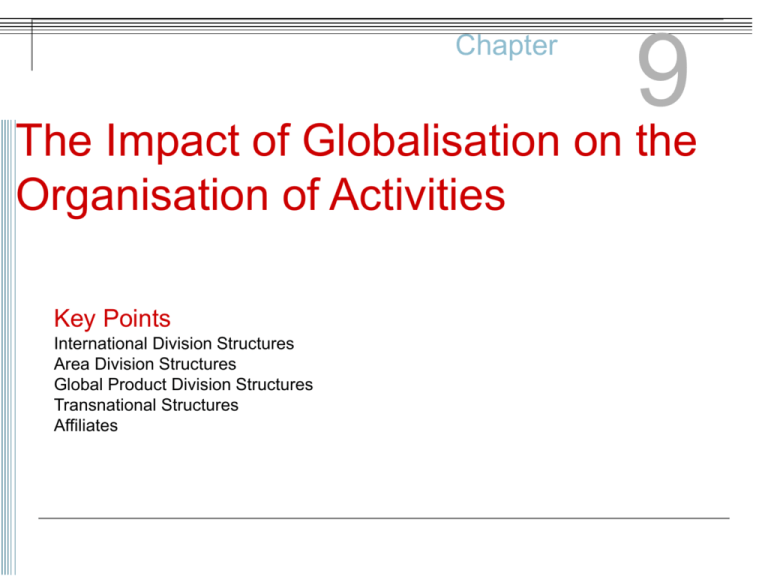
9 The Impact of Globalisation on the Chapter Organisation of Activities Key Points International Division Structures Area Division Structures Global Product Division Structures Transnational Structures Affiliates International Division Structure CEO VP Product A VP Product B VP Product C VP International Domestic Market Domestic Market Domestic Market International Market Area Division Structure VP International General Manager General Manager General Manager (Far East) (Europe) (Latin America) Country Manager Country Manager Country Manager (Germany) (France) (Italy, etc.) Multidomestic Affiliates In multidomestic affiliates, local CEOs report to area presidents, manage a wide array of the parent company’s product lines, but have considerable leeway in making production, marketing, and servicing decisions. Host countries have long used the term miniature replica to describe the traditional multidomestic affiliate. Multidomestic Affiliates Multidomestic affiliates are typically evaluated by profit center criteria keyed to results rather than adherence to head office policies. Usually, local nationals are appointed as country managers and management turnover is relatively slow. Each affiliate often takes on a character and personality of its own, and formulates its own internal strategy. Problems with Multidomestic Affiliates Communications between home country product divisions and distant overseas affiliates are often more complex and risk breaking down. Corporate policies and standards may not be effectively communicated to or adopted by the affiliates. Problems with Multidomestic Affiliates Affiliate autonomy is not conducive to global MNC learning. As affiliates develop self-sufficiency, the power of home country managers may be challenged. Global Product Division Structure CEO VP Product A VP Product B VP Product C Worldwide Worldwide Worldwide ---R&D ---R&D ---R&D ---Production ---Production ---Production ---Marketing ---Marketing ---Marketing ---Accounting ---Accounting ---Accounting ---Service ---Service ---Service Global Affiliates Affiliates Do not operate with a great deal of autonomy. Become an integrated part of a global organization and often play no independent strategic role at all. Are evaluated as cost centers. The profit center concept just does not fit the strategy. Largely treated as a source of supply or as sales offices. Contrasting Structures Global Multidomestic Product Structure Area Structure Product-Line Market Emphasis Transfers Affiliate Evaluation Affiliate Role Specialized International Product/Technology Cost Center Implement Strategy Affiliate Autonomy Low Affiliate Management Expatriates, Short-Term Duplicated National Technology/Skills Profit Center Develop & Implement strategy High Local, Long-Term Transnational Structures Represents an attempt to concurrently capture all of the advantages of area and global product division structures. In transnational structures Configuration and coordination of activities are mixed; affiliates play leadership roles for some activities and supporting roles for others. Decisions are based on maximizing the use of company skills and competencies, irrespective of activity location or affiliate nationality. Transnational Structures In transnational structures Company acts essentially as a network of activities with multiple headquarters spread across different countries. Affiliate roles shift over time and learning and sharing are emphasized. Emphasis on extensive horizontal linkages, effective communication and extreme flexibility. Affiliate Competence and Affiliate Initiative Low affiliate capability High affiliate capability Form Alliances or Take strategic High make Initiative localization Acquisitions pressures Follow Parent Influence Parent High Instructions Strategies globalization pressures *This diagram is adapted from a diagram in Bartlett and Ghoshal's "Tap Your Affiliates for Global Reach". Seamless Organisations A driving goal of an increasing number of companies is the development of a seamless organization. Barriers prevent learning, produce inefficiencies, and blunt responsiveness. Seamlessness comes only through destroying barriers inside and outside the organization. Teams are the primary unit of analysis in the seamless organization. Seamless Organisations Seamless organizations are also pre-occupied with erasing boundaries inside the company. The growth of Internet exchanges now enables companies of all sizes to access global suppliers and buyers without necessarily having a global presence. Chapter The Evolving Multinational Key Points Dimensions of Evolution MNC Evolution – An Integrated Process 10 Dimensions of Evolution Geographic Expansion Line of Business Diversification Geographic Proximity Cultural Similarity Similarity in Economic Development Liability of Foreignness Functional Migration Geographic Expansion Geographic Proximity MNC enters neighboring country/countries, Sequential move to farther places Cultural Similarity Move into country with low “psychic distance” vis-à-vis home country Enables effective communication, better understanding of local customs and markets Geographic Expansion Similarity in Economic Development Entry into countries with high levels of disposable income Similar buying habits as home market consumers Line of Business Diversification Entry facilitated by competing in single line of business, other businesses progressively added Competitive advantage versus local firms Exhibit 10-1 Typical Pattern of Line of Business Diversification LOB 1 LOB 2 LOB 3 LOB 4 Time Liability of foreignness Functional Migration Refers to development of activities performed by lines of business within a country Strategic Leadership Exhibit 10-2 Typical Pattern of Functional Migration Business Planning Local Design and Procurement Assembly Marketing and Distribution Time MNC Evolution – An Integrated Process The dimensions of evolution are interconnected Ways of integration across dimensions Accelerated Evolution MNC evolves along all the dimensions at the same time Punctuated Evolution Evolution is discontinuous and skips steps Efficient evolution that maximizes salutary effects of scale and scope economies MNC Evolution – An Integrated Process Reverse Evolution Restructuring of operations Consolidation of lines of business and shutting down subsidiaries


